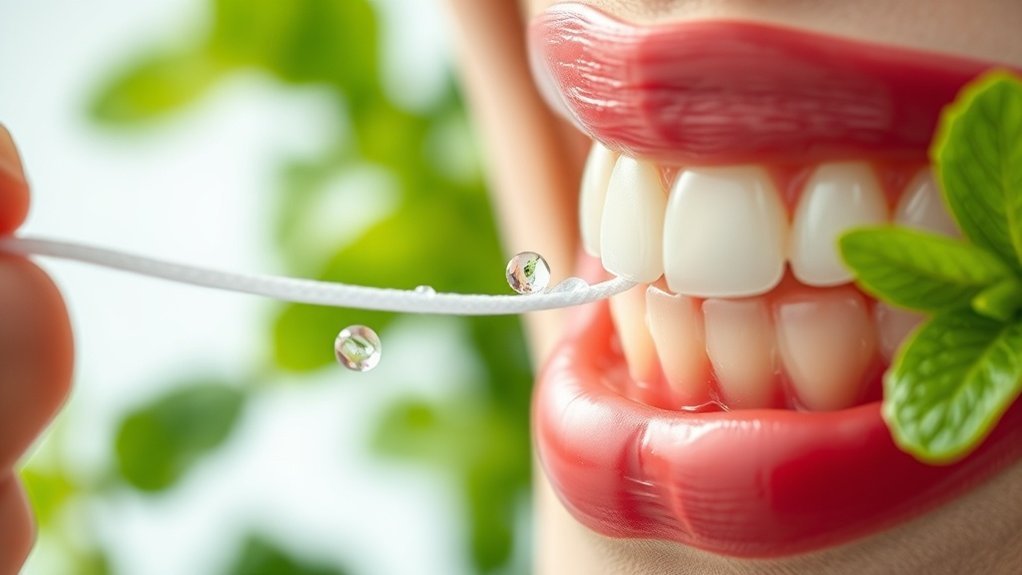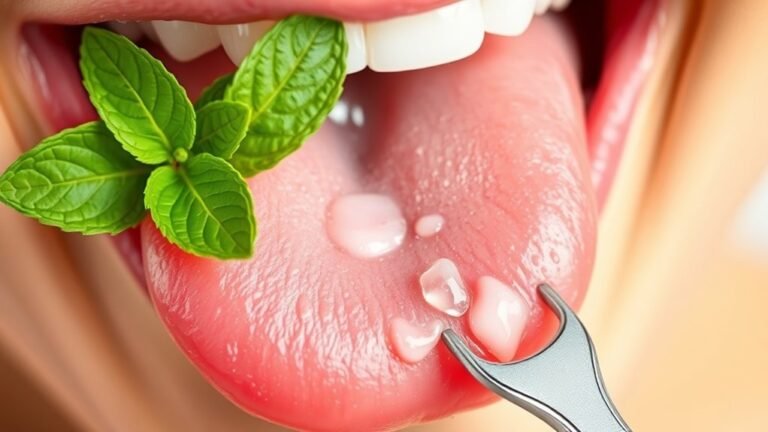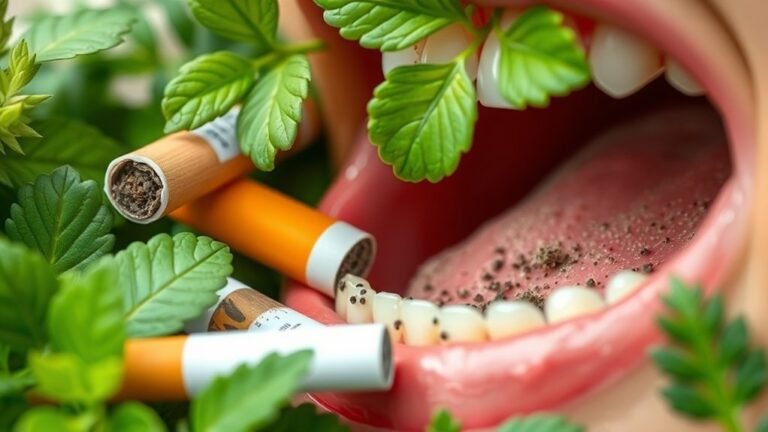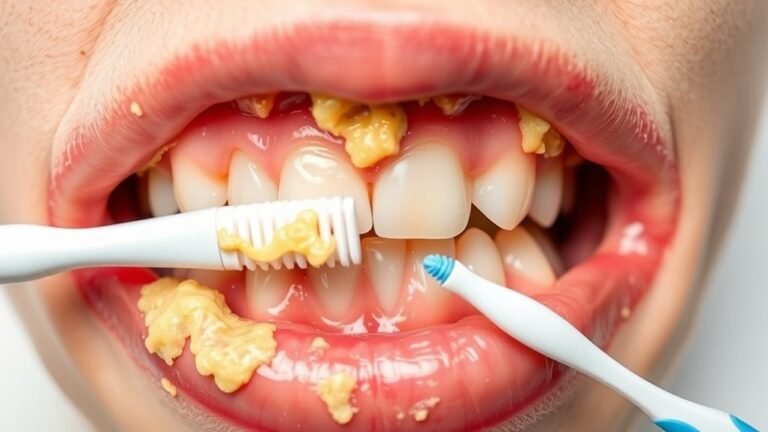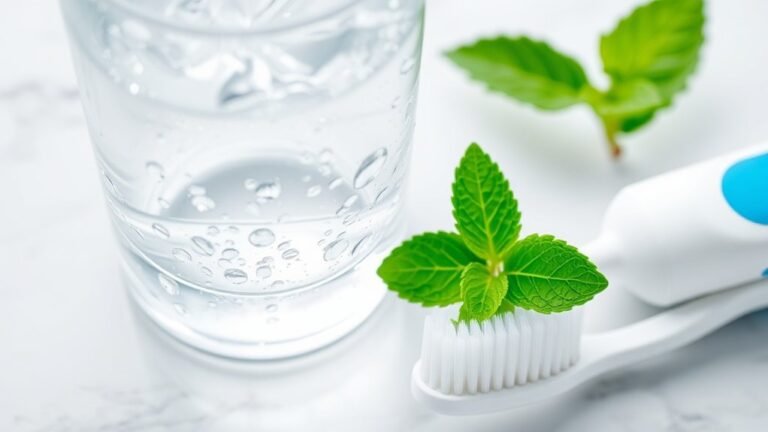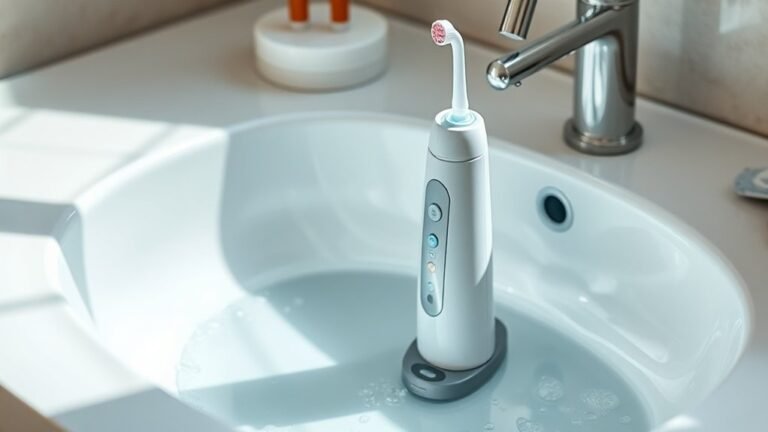Daily Flossing Cuts Down Food Particles Feeding Bad Breath Bacteria
Daily flossing greatly cuts down food particles that feed bad breath bacteria. When you floss, you remove debris and plaque between your teeth, preventing bacteria from thriving. Neglecting to floss allows these particles to linger, promoting the growth of odor-causing bacteria and volatile sulfur compounds. Incorporating flossing into your routine not only freshens your breath but also supports overall oral hygiene. There’s more to discover about how to enhance your breath and oral care practices.
Key Takeaways
- Daily flossing removes food particles trapped between teeth, reducing the nourishment available for bad breath bacteria.
- Effective flossing prevents plaque buildup, which can harbor bacteria that contribute to halitosis.
- By eliminating food debris, flossing helps decrease the production of volatile sulfur compounds causing foul odors.
- Regular flossing promotes healthier gums, preventing gum disease linked to bad breath.
- Combining flossing with brushing enhances overall oral hygiene, leading to fresher breath.
Understanding Bad Breath and Its Causes
Although bad breath can be embarrassing, understanding its causes can help you tackle the issue effectively. Halitosis, commonly known as bad breath, often stems from the buildup of bacteria in your mouth. These bad breath bacteria thrive on food particles and dead cells, producing foul-smelling compounds that lead to unpleasant breath odor. Poor oral hygiene practices, such as infrequent brushing and neglecting tongue cleaning, can exacerbate this problem. When you fail to eliminate plaque and food debris, you create an environment where bacteria flourish. Additionally, certain foods, dry mouth, and underlying health conditions can contribute to persistent halitosis. By improving your oral hygiene routine, you can greatly reduce the bacteria responsible for bad breath and enjoy fresher breath.
The Role of Flossing in Oral Hygiene
While regular brushing is essential for maintaining oral health, flossing plays a crucial role in your overall hygiene routine. Daily flossing helps remove food particles and plaque buildup between your teeth, areas that a toothbrush often misses. This action not only helps prevent tooth decay but also acts as an effective bad breath treatment. When you skip flossing, plaque can harden, leading to gum inflammation and potential periodontal disease. By incorporating flossing into your daily regimen, you reduce the risk of these issues and promote healthier gums. Remember, a complete oral hygiene routine includes both brushing and flossing, ensuring that you maintain fresh breath and overall dental health. Don’t underestimate the power of daily flossing in achieving ideal oral hygiene.
How Food Particles Contribute to Bad Breath
When food particles linger in your mouth after eating, they can quickly become a source of bad breath. These particles provide nourishment for breath odor bacteria, leading to unpleasant smells. If you don’t practice plaque control through regular brushing and flossing, the bacteria thrive on the leftover food, resulting in increased bacterial growth. This growth can cause your mouth to become a breeding ground for odor-producing compounds. As these bacteria break down the food particles, they release volatile sulfur compounds that contribute to halitosis. To combat this, it’s essential to remove food particles daily through effective oral hygiene routines. By doing so, you can minimize bacterial growth and maintain fresher breath, ultimately improving your overall oral health.
The Bacteria Behind Bad Breath
Food particles aren’t the only culprits behind bad breath; the bacteria in your mouth play a significant role as well. These mouth bacteria form a bacterial biofilm on your teeth and gums, which can lead to unpleasant odors. When you neglect proper oral hygiene, plaque builds up, allowing these bacteria to thrive and produce sulfur compounds contributing to bad breath.
To keep your breath fresh, focus on:
- Regular plaque removal through brushing and flossing.
- Targeting bacterial biofilm by using antibacterial mouthwash.
- Incorporating breath freshening foods like apples and mint.
Benefits of Daily Flossing for Fresh Breath
Daily flossing is essential for maintaining fresh breath, as it effectively removes food particles and plaque that your toothbrush might miss. When you incorporate flossing into your dental care routine, you help control breath odor by eliminating debris that can feed harmful bacteria. These bacteria thrive in the oral microbiome, contributing to dental plaque buildup and bad breath. By flossing daily, you disrupt their habitat, promoting a healthier mouth and fresher breath. This simple habit not only enhances your overall oral hygiene but also minimizes the chances of developing gum disease, which can worsen breath issues. Prioritizing daily flossing is a straightforward way to support your dental health and enjoy the confidence of fresh breath throughout the day.
Tips for Effective Flossing Techniques
Mastering effective flossing techniques can greatly enhance your oral hygiene routine. By incorporating proper methods, you can help prevent gum disease, support cavity prevention, and reduce tongue bacteria that contribute to bad breath. Here are three tips to improve your flossing:
- Use the right amount: Take about 18 inches of floss, wrapping it around your fingers for better control.
- Be gentle: Slide the floss gently between your teeth, curving it around each tooth to clean the sides effectively without damaging your gums.
- Don’t forget the back teeth: Make certain you floss between all your teeth, especially the back ones, as they’re often overlooked during dental cleaning.
Following these steps will not only keep your mouth fresh but also promote overall dental health.
Incorporating Flossing Into Your Daily Routine
Although it might seem challenging to incorporate flossing into your daily routine, doing so is essential for maintaining peak oral health. Start by setting a specific time each day, perhaps after brushing your teeth, to make it a habit. Keep dental floss handy in places you often visit, like your bathroom or purse. If you wear dentures, remember that denture cleaning is just as critical; flossing helps prevent oral infections and bacterial infections. Complement your routine with mouthwash to further eliminate bacteria and freshen your breath. By consistently flossing every day, you’ll not only reduce bad breath but also enhance your overall dental hygiene, ensuring a healthier mouth for years to come.
Frequently Asked Questions
Can Mouthwash Replace the Need for Flossing?
No, mouthwash can’t replace flossing. While it helps freshen breath and reduce bacteria, it doesn’t effectively remove plaque and food particles stuck between teeth. Incorporating both into your dental routine is essential for peak oral health.
How Often Should I Replace My Dental Floss?
You should replace your dental floss every three to six months. Why wait until it frays? Regularly changing it guarantees effective cleaning and maintains your oral health, keeping your smile bright and fresh.
Is There a Specific Type of Floss That’s Best?
Yes, choose a floss that suits your needs. Waxed floss glides easily between tight spaces, while unwaxed offers a thinner option. Consider flavored varieties for a revitalizing touch, making your flossing routine more enjoyable and effective.
Can Flossing Too Much Damage My Gums?
Flossing too much can indeed damage your gums. About 30% of people experience gum irritation from excessive flossing. It’s crucial to find a balance, ensuring you maintain gum health without causing unnecessary harm.
What Are the Signs of Improper Flossing Technique?
You might notice bleeding gums, discomfort, or receding gum lines if you’re flossing improperly. Additionally, if you feel pain or see frayed floss, it’s a sign you need to adjust your technique.
Conclusion
Incorporating daily flossing into your oral hygiene routine not only helps eliminate food particles but also reduces the bacteria that cause bad breath. By committing to this simple practice, you enhance your overall dental health, boost your confidence, and enjoy fresher breath throughout the day. Remember, consistent flossing clears the way for better breath, prevents plaque buildup, and promotes healthier gums. Make flossing a priority, and you’ll reap the rewards of a cleaner, fresher mouth.
